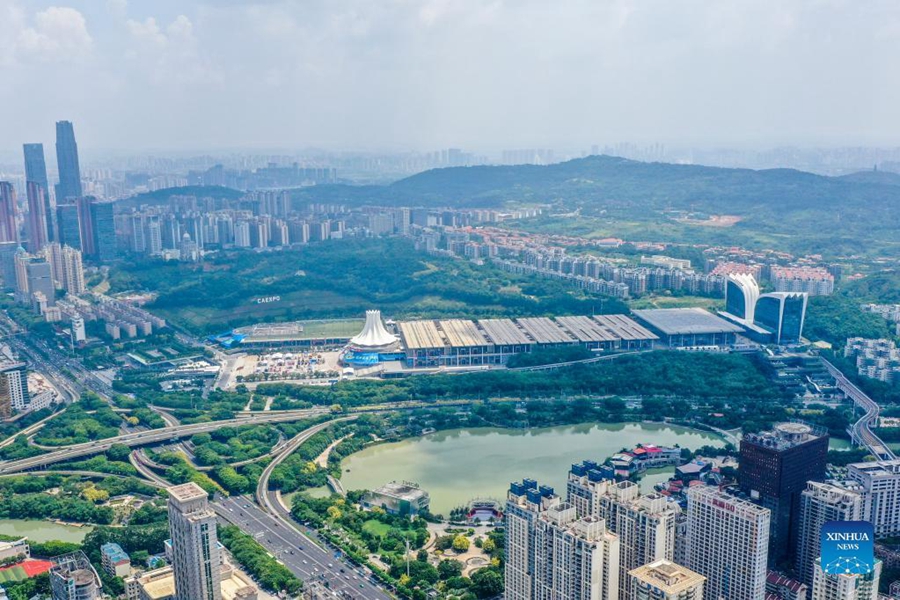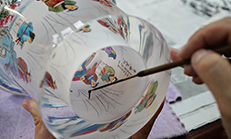China-ASEAN Expo testifies to resilient regional economy, fosters greater recovery
NANNING, Sept. 11 (Xinhua) -- The ongoing 18th China-ASEAN Expo and China-ASEAN Business and Investment Summit held on time despite a raging pandemic worldwide has testified to the vitality and resilience of an integrated regional market, and showcases the potentials of a key platform to make possible all-round trade and economic cooperation.
Starting Friday both online and offline in Nanning, capital of south China's Guangxi Zhuang Autonomous Region, the four-day expo has attracted enterprises from more than 40 countries and regions, with special events to mark the 30th anniversary of China-ASEAN dialogue relations.
BRINGS GOODWILL TO FRUITION
"This year's expo provides an important platform to enhance trade and investment opportunities between ASEAN and China during this crucial time of economic recovery, as well as positively contribute to the longstanding relationship between our two sides," ASEAN Secretary-General Lim Jock Hoi said via video link at the expo's opening ceremony on Friday.
As a crucial facet of China-ASEAN relations, the expo has long been fruitful in helping the two sides synergize their respective development efforts. This year's edition will host 26 high-level forums and nearly 150 promoting events on the Regional Comprehensive Economic Partnership and key industries.
A total of 179 deals worth more than 46.59 billion U.S. dollars, the highest ever figure, were signed late Friday at the expo, a growing number of which are in green economies, according to expo officials.
Experts have said that digital connectivity plays a key role in sustaining the resilience of the regional economy in face of the pandemic. It has become a frontier that could one day grow into "a whole new landscape for ASEAN and China to collaborate, such as in financial technology, that supports our digital transformation agenda," Lim noted.
Koh Chin Yee, president of Singapore's South Seas Society, said ASEAN countries, in varying stages of development, have great potential to further cooperate with China in emerging realms such as consumers markets, digital infrastructure, energy, and professional services.
TIDING THROUGH HAVOC OF PANDEMIC
This year's expo is the second of its kind to set up an exhibition area exclusively for medical service and supplies, with featured life-saving items for frontline workers, including pristine virus-testing equipment, all sorts of medical gloves, and positive-pressure suits.
Wilson Lee Flores, a columnist for English daily The Philippine Star, told Xinhua that it was China who had come to support the Philippines in terms of key medical supplies in a difficult time.
"When some countries in the West refused to even sell us vaccines, China came and sent vaccines ... not just one time. So the future is even more exciting," he said, referring to a good prospect of cooperation.
China's trade volume of medical products with ASEAN reached 13.3 billion dollars in the first seven months this year, up 32 percent year-on-year, said Xu Jinghe, deputy commissioner of the National Medical Products Administration, at a summit in Guangxi ahead of the expo.
The total trade volume of medical products between China and ASEAN hit 18 billion dollars in 2020, surging by 72 percent year-on-year, Xu added.
What's more, ASEAN remains a top agri-trade partner of China despite the still-rampant pandemic.
Since China has scientifically coordinated epidemic prevention and economic activities, hot-selling goods such as Thai durians and Malaysian coffee beans keep making a bundle, especially on Chinese e-commerce platforms during the pandemic.
China's "huge and robust market is very attractive to ASEAN members," said Joseph Matthews, senior professor at the BELTEI International University in Phnom Penh, noting that Cambodia attends the expo many times, coveting the unique chance to promote mangos and bananas.
ENDURING LEGACY GIVES HOPE
A series of celebratory events are being held to mark the 30th anniversary of China-ASEAN dialogue relations at the expo, with experts saying that after advancing in leaps and bounds over such a long period of time, the momentum of cooperation has been carried forth to the present day.
"After 30 years of dialogue, peace, and continued partnership, the ASEAN countries and China already have trust and good understandings," a foundation for them to become the fastest-growing region in the world, Flores noted.
The bilateral trade rose from 8.36 billion dollars in 1991 to 685.28 billion dollars in 2020, with an average annual growth rate of 16.5 percent, data from the Chinese customs shows. In the first half of 2021, bilateral trade reached 412 billion dollars, up 27.8 percent year-on-year.
The China-ASEAN relations have seen frequent dialogues and exchanges at all levels, allowing them to become each other's good neighbors, good partners, and good friends, Khin Ma Ma Myo, an international relations professor at the University of Yangon, told Xinhua.
The dialogue relations have "evolved into a multifaceted strategic partnership and shown tremendous progress on all fronts," said Lim.
As China and ASEAN countries continue to work with each other to align their development strategies with the Belt and Road Initiative, their relations are set to enter a new stage, said Khin Ma Ma Myo. Enditem
(Xinhua reporters Pan Qiang and Hu Jiali from Nanning, Liu Kai and Yan Jie from Manila, Mao Pengfei from Phnom Penh, Cai Shuya from Singapore, and Zhang Dongqiang from Yangon also contributed to the story.)
 |
Photos
Related Stories
Copyright © 2021 People's Daily Online. All Rights Reserved.











